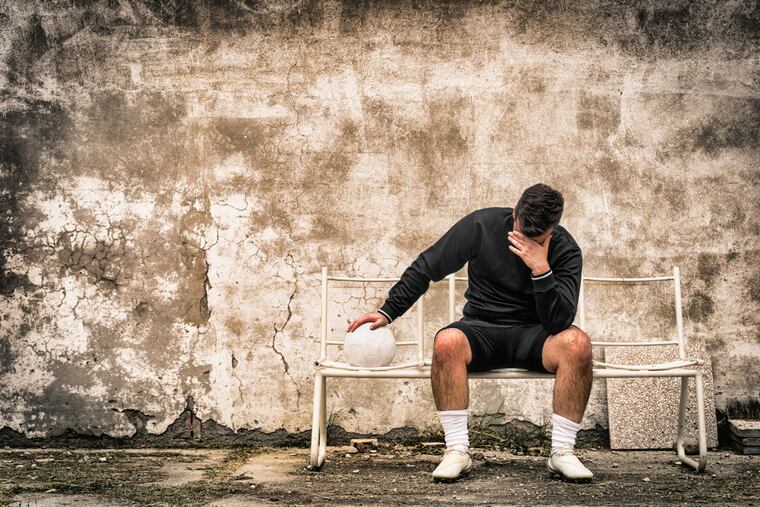Q&A: Why are so many college athletes depressed?
Exercise has long been touted as a way to alleviate depression. So shouldn't some of our ultimate exercisers - college athletes - be among society's least depressed?

Exercise has long been touted as a way to alleviate depression.
So shouldn't some of our ultimate exercisers - college athletes - be among society's least depressed?
Perhaps not. Research now suggests that nearly a quarter of college athletes experience depressive symptoms, a rate thought to be similar to that of their nonathlete peers.
The researchers, led by Drexel University's Eugene Hong, a sports-medicine physician and associate dean of primary-care and community health in the College of Medicine, recently completed one of the largest studies yet of depression symptoms in undergraduate athletes. The results were published in the February issue of the British Journal of Sports Medicine.
Coincidentally, the National Collegiate Athletic Association recently emphasized the importance of providing mental-health services for athletes as a component of their overall well-being, releasing new guidelines for how schools can address student athletes' mental health.
Hong recently spoke to us about the study.
Why focus on student athletes?
There is a perception among some people in the public that athletes might be, if not immune to depression, then maybe at decreased risk.
But I've been a sports-medicine doctor and a team physician at the college level for 18 years or so. Most of us who are involved with taking care of college athletes are aware that mental-health issues are a very real concern.
So it is a little paradoxical. We didn't have the research to support either position. We wanted to understand this better and add to the body of knowledge. We didn't even know how big of a problem this is.
How did you go about the study?
The study was conducted over three years and involved 465 athletes at a private Division 1 college. Each year, the athletes were given a validated survey screening tool for depression, asking them whether they've had depressed mood, loss of pleasure, trouble sleeping, and other diagnostic criteria. The results were then scored. This is not a diagnosis of depression. These tools just identify who may fit the criteria for depression.
The results?
What we found was 23.7 percent of the athletes reported clinically elevated symptoms of depression - a rate probably comparable to the general college population. And 6 percent of them actually scored even higher, suggesting that they might fit a moderate to more severe level of depression diagnosis.
We also looked at the result by gender and by sport. We found that females were at almost twice the risk for depressive symptoms than males - 28.1 percent for females and 17.5 percent for males. That actually mirrors what is in the literature in terms of depression prevalence. Females overall tend to be at higher risk.
By sport, we found that track and field athletes had twice the risk of depressive symptoms compared to other sports.
That was interesting, and so far we only have theories for why that would be. Track and field is obviously an individual sport vs. a team sport. The athletes' performance is based on single events that often occur over seconds vs. 60 minutes or longer in a team sport. So there may be more pressure focused on just a few seconds.
Another possible aspect is there might be 50 competitors in a single track and field event, and there's only one winner vs. having 50 players on a field, two teams, and half are going to be winners. Lastly, the injury rates in track and field might be higher than that of other sports.
Overall, why would athletes be depressed?
College athletes have some unique aspects to their lives. They have pressures on time management. They can spend up to 40 hours a week at their sport. That's on top of their school work and everything else in their lives. They also may have pressure to meet expectations in their athletic endeavors. That might be pressure they put on themselves, but also pressure from their families or coaches. That might increase the stress.
And often, college athletes may link their athletic activity to their sense of identity. If they are injured, that in itself can be a source of stress for them. But if it means they are taken out of their sport, that can affect their sense of self, who they are. These are all things we want to study.
Although this study looked specifically at college athletes, are there broader implications?
We certainly hope our research will support the argument for improved mental-health assessments for college athletes.
But as a sports-medicine physician, I'm very interested in the mental health of all athletes. We really do want people of all ages and abilities to exercise regularly. We have proved exercise is beneficial. They'll live longer, their organs will function better, and their quality of life will be better. We want our youths and teenagers to exercise. We want our older patients to exercise.
Do these results among college athletes translate to people of other ages? We don't know. Do we need to look at the adolescent athlete? Absolutely.
One important thing: If you're injured and the mental-health consequences of the injury are not addressed, it actually may impact your recovery. This is a related issue that needs further research.